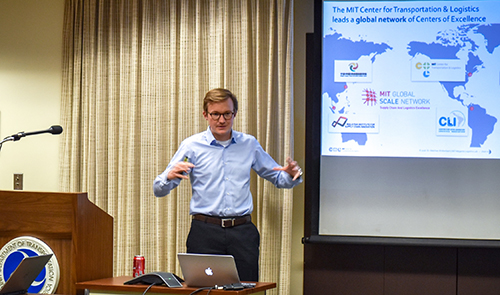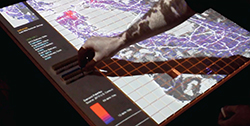Last-Mile Delivery: The Holy Grail of Freight Logistics
Solutions that let freight companies easily deliver inventory to stores in urban centers are the holy grail for logistics experts like Matthias Winkenbach of MIT’s Center for Transportation and Logistics.
What’s standing in the way of grasping that holy grail? The complex dynamism of cities.
“Density is the main driver of complexity when it comes to urban last-mile distribution,” Winkenbach said during a recent talk at U.S. DOT’s Volpe Center.
Winkenbach’s lab at MIT aims at research that’s more than theoretical—that can have real-world impacts toward finding better ways to bring goods and services to dense urban centers. The lab team’s focus areas are:
- Distribution network design: How can companies operate more efficiently?
- Infrastructure and freight policy design: How do things like dedicated parking spaces for freight affect distribution efficiency?
- Data access: How can people exploit modern sources of data to inform better policy decisions in designing distribution networks?
One project Winkenbach’s lab did with Anheuser-Busch InBev investigated last-mile logistics in Mexico City, a massively congested urban center where there are small grocery stores on about every other block. Winkenbach found these stores don’t carry inventory for more than two days’ worth of sales—meaning Anheuser-Busch InBev trucks need to visit every store every other day.

And new technologies mean customer expectations are changing, with more expectations of speed, flexibility, transparency, and reliability in last-mile deliveries, without having to pay more.
“What will be the impact of, say, autonomous trucks circling through a city without stopping, to move closer to where demand will occur within the next few minutes, to continually minimize difference between inventory and customer?” Winkenbach said. “This research is extremely data intensive, and it is difficult to efficiently route in highly congested and uncertain environments.”
High-resolution transactional data is key to understanding the true complexity and stochasticity of urban operations, Winkenbach said. Movement data is key, especially GPS data coupled with cell phone data, to triangulate where vehicles actually move. With high-resolution data, companies and planners can figure out where drivers park, and plan based on those patterns.
But there is no one-size fits all solution.
“No city is the same and within a city we don’t see two areas that are the same—you have to learn from previous delivery processes to become more efficient,” Winkenbach said. “We can build fancy models but if policy makers and companies don’t understand them, they have no impact.”
 That’s why Winkenbach and his colleagues use physical, visual interfaces to help policy makers find signals within the noise. In San Francisco, the team used a projected display of the city on an electronic board. Decision makers were given Lego bricks representing distribution centers, which they could plug into the board to see how the placement of those centers would affect traffic flow.
That’s why Winkenbach and his colleagues use physical, visual interfaces to help policy makers find signals within the noise. In San Francisco, the team used a projected display of the city on an electronic board. Decision makers were given Lego bricks representing distribution centers, which they could plug into the board to see how the placement of those centers would affect traffic flow.
“We’ve got to talk about highly analytical problems, like last mile-distribution networks, in the same way and intuitively, because you often have multidisciplinary teams making decisions,” Winkenbach said.
Upcoming Events at Volpe

September 21, 2017: Jeffrey Schnapp of Harvard University will kick off of Volpe’s new speaker series, The Ongoing Transformation of the Global Transportation System.
October 5, 2017: The Atlantic Council’s Joshua Corman will discuss current and future challenges in transportation cybersecurity as part of Volpe's speaker series The Ongoing Transformation of the Global Transportation System.
See our Upcoming Events page for more thought leadership events.
